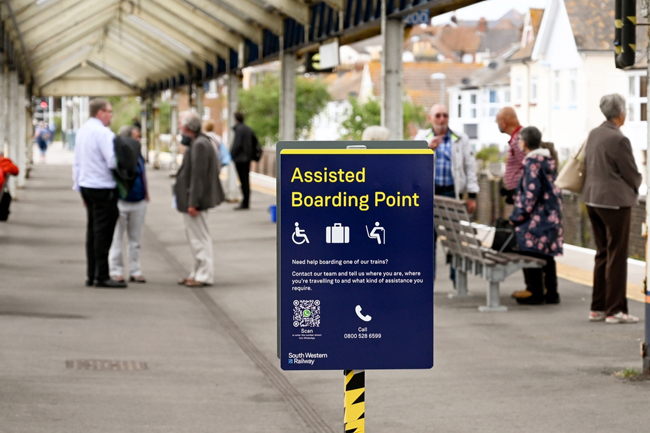The equalities watchdog is considering an intervention over claims that staffing cuts will lead to a ‘human rights crisis on Britain’s railways’.
In a letter to the Equality and Human Rights Commission (EHRC), campaigners led by former UN Rapporteur for poverty Professor Philip Alston claimed that the Government had ignored a warning from the EHRC three years ago about the impact of destaffing on disabled passengers.
‘Rail accessibility is in a state of national emergency and we call for your urgent intervention,' they wrote.
‘With widespread allegations of mass ticket office closures and nationwide industrial action over railway destaffing, this could be our last chance to prevent an escalating human rights crisis on Britain’s railways.’

Poole, Dorset, July 2021
The letter cited a report in the Sunday Times in June that the rail industry has drawn up a secret strategy to phase out paper tickets and close or repurpose 980 ticket offices in England, starting in September.
They called on the EHRC to demand the Government ‘provides full transparency about any new staffing models under consideration’.
The campaigners also called on the Government to undertake a full public consultation on ‘critical cross-industry functions’ such as timetabling, ticket retail, fares, and the commercial and operational management of stations, ‘including how an inclusive staffing model will support these functions’.
In response, an EHRC spokesperson said: ‘We are committed to upholding disabled people’s right to equal travel and know many disabled or older passengers rely on station staff and ticket offices to access rail services.
‘Service providers must make reasonable adjustments to ensure disabled people are not unfairly disadvantaged. We are carefully considering the association’s letter and will respond in due course.’
The Department for Transport claimed that train operating companies ‘are independent employers who ultimately decide their own staffing models’.
However, a spokesperson said: ‘We want to ensure that railway staff can help all customers where needed, and our reforms will enable us to move staff out of underused ticket offices and provide help where it's most needed in the station.’
In their letter, the campaigners pointed out that the majority of TOCs operate under National Rail Contracts, ‘which spell out in detail the staffing resources available to train operators and how they should be allocated’.
Other signatories to the letter include Ann Bates OBE, transport access consultant and former UK government advisor on transport accessibility; Andrew Hodgson, president of the National Federation of the Blind of the UK; and Emily Yates, co-founder of the Association of British Commuters.
Ms Bates said: 'True modernisation would mean an inclusive railway that supports disabled people’s right to independent living - not staffing cuts that ignore the needs not only of disabled people, but also a large proportion of the travelling public.’
Ms Yates said: ‘The EHRC must intervene immediately in the Government's plans, which are sure to lead to an historic act of mass discrimination on our railways.’
Register now for full access
Register just once to get unrestricted, real-time coverage of the issues and challenges facing UK transport and highways engineers.
Full website content includes the latest news, exclusive commentary from leading industry figures and detailed topical analysis of the highways, transportation, environment and place-shaping sectors.
Use the link below to register your details for full, free access.
Already a registered? Login